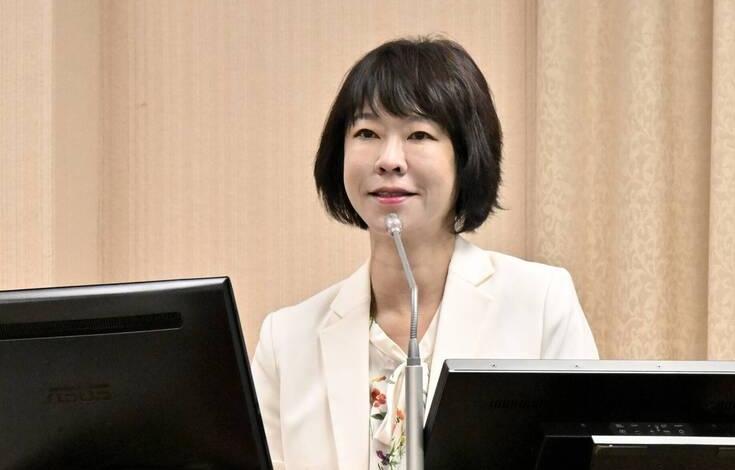A preliminary date has been set for the next round of trade negotiations with the US regarding US President Donald Trump’s reciprocal tariffs, Deputy Trade Representative Yen Huai-shing (顏慧欣) said today.
Updated US tariff rates are set to take effect worldwide on Aug. 1, following an executive order issued to extend the 90-day cool-off period, originally set to end on Wednesday last week.
On Monday last week, Trump sent letters to Japan and South Korea — important East Asian trading partners — saying that a 25 percent tariff would be imposed on imported goods.

Photo: George Tsorng, Taipei Times
As of today, no announcement has been made regarding Taiwan’s tariff rate.
Taiwan was not among the two dozen countries that received a letter from the Trump administration last week.
The Legislative Yuan’s Foreign Affairs and National Defense Committee today invited relevant agencies to report on the progress of tariff negotiations and response measures.
There have already been three rounds of in-person Taiwan-US tariff negotiations and multiple online meetings.
Both sides recognize that progress has been made thus far, although countries around the world are also awaiting a time slot for trade talks, Yen told lawmakers.
They aim to reach a consensus by Aug. 1, she said, adding that the letters do not mean that tariff rates have been finalized.
According to international precedent, both sides must reach a consensus, and would usually sign a draft agreement before publicly announcing any details, she added.
Saying that Japan revealed its bottom-line position to the US during negotiations, Chinese Nationalist Party (KMT) Legislator Hsu Chiao-hsin (徐巧芯) asked about Taiwan’s “bottom line.”
The lawmaker also asked whether negotiations would include labeling related to ractopamine — a controversial beta-agonist used to promote leanness in livestock — a zero-tariff policy or importing genetically modified foods.
Every country is obligated to uphold confidentiality in their tariff talks with the US, Yen said.
Taiwan’s bottom line is safeguarding national interests, domestic industries, food security and public health, she added.
Hsu has raised issues that concern US interests, which are indeed part of negotiations, but the final consensus cannot be disclosed at this stage, she said.
Negotiations remain ongoing, and there is a certain “give and take” element to discussions, although they remain in good faith, Deputy Minister of Foreign Affairs Chen Ming-chi (陳明祺) said.
Meanwhile, a Politico report released yesterday said that although Taiwan did not receive a letter last week, “it’s the countries that didn’t receive letters that may be closer to reaching real agreements.”
“The letters are pretty aggressive and direct,” said Mark Linscott, a former negotiator for the US Trade Representative’s Office.
A White House official, granted anonymity to share the administration’s plans, confirmed that no more tariff letters to countries were in the works as of yesterday, although they added that it is a “fluid situation,” the report said.

The Coast Guard Administration (CGA) yesterday said it had deployed patrol vessels to expel a China Coast Guard ship and a Chinese fishing boat near Pratas Island (Dongsha Island, 東沙群島) in the South China Sea. The China Coast Guard vessel was 28 nautical miles (52km) northeast of Pratas at 6:15am on Thursday, approaching the island’s restricted waters, which extend 24 nautical miles from its shoreline, the CGA’s Dongsha-Nansha Branch said in a statement. The Tainan, a 2,000-tonne cutter, was deployed by the CGA to shadow the Chinese ship, which left the area at 2:39pm on Friday, the statement said. At 6:31pm on Friday,

The Chinese People’s Liberation Army Navy’s (PLAN) third aircraft carrier, the Fujian, would pose a steep challenge to Taiwan’s ability to defend itself against a full-scale invasion, a defense expert said yesterday. Institute of National Defense and Security Research analyst Chieh Chung (揭仲) made the comment hours after the PLAN confirmed the carrier recently passed through the Taiwan Strait to conduct “scientific research tests and training missions” in the South China Sea. China has two carriers in operation — the Liaoning and the Shandong — with the Fujian undergoing sea trials. Although the PLAN needs time to train the Fujian’s air wing and

Taiwanese celebrities Hank Chen (陳漢典) and Lulu Huang (黃路梓茵) announced yesterday that they are planning to marry. Huang announced and posted photos of their engagement to her social media pages yesterday morning, joking that the pair were not just doing marketing for a new show, but “really getting married.” “We’ve decided to spend all of our future happy and hilarious moments together,” she wrote. The announcement, which was later confirmed by the talent agency they share, appeared to come as a surprise even to those around them, with veteran TV host Jacky Wu (吳宗憲) saying he was “totally taken aback” by the news. Huang,

The American Institute in Taiwan (AIT) put Taiwan in danger, Ma Ying-jeou Foundation director Hsiao Hsu-tsen (蕭旭岑) said yesterday, hours after the de facto US embassy said that Beijing had misinterpreted World War II-era documents to isolate Taiwan. The AIT’s comments harmed the Republic of China’s (ROC) national interests and contradicted a part of the “six assurances” stipulating that the US would not change its official position on Taiwan’s sovereignty, Hsiao said. The “six assurances,” which were given by then-US president Ronald Reagan to Taiwan in 1982, say that Washington would not set a date for ending arm sales to Taiwan, consult